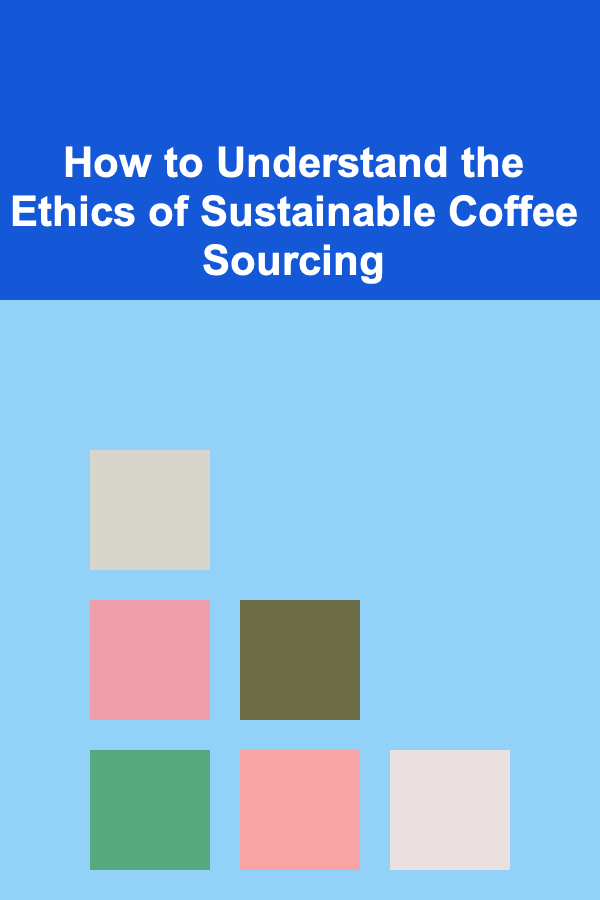
How to Understand the Ethics of Sustainable Coffee Sourcing
ebook include PDF & Audio bundle (Micro Guide)
$12.99$8.99
Limited Time Offer! Order within the next:

The coffee industry is a global powerhouse, with millions of people across the world relying on its cultivation, trade, and consumption. In recent years, however, growing awareness about environmental degradation, social injustice, and ethical concerns has spurred many coffee drinkers and businesses to question the origins of their coffee. This conversation has led to the rise of sustainable coffee sourcing as a critical focus for both consumers and producers alike. But what does "sustainable coffee sourcing" truly mean, and why is it essential to the coffee industry's future? This article delves into the ethics of sustainable coffee sourcing, exploring the complexities of environmental and social impacts, the role of fair trade certification, and the ways consumers can contribute to more ethical coffee consumption.
The Coffee Supply Chain: A Complex Network
To fully understand the ethical implications of coffee sourcing, it's essential first to consider the complexity of the coffee supply chain. Coffee is grown in tropical regions, particularly in countries located between the Tropic of Cancer and the Tropic of Capricorn. The top coffee-producing countries include Brazil, Vietnam, Colombia, Indonesia, and Ethiopia. Once harvested, the beans go through several stages before reaching the consumer's cup, including processing, roasting, packaging, and distribution.
The Traditional Coffee Supply Chain
In the traditional coffee supply chain, coffee is often grown by smallholder farmers who may not have access to modern farming techniques or resources. These farmers typically rely on intermediaries or coffee exporters who purchase the beans and sell them to roasters, who in turn sell the roasted beans to retailers. This system can create inefficiencies and power imbalances, leading to issues such as unfair pricing, poor working conditions, and environmental harm.
The traditional approach often prioritizes profits over sustainability, which can result in the exploitation of workers, environmentally damaging farming practices, and an unsustainable industry that contributes to deforestation, soil degradation, and climate change. As the demand for coffee increases worldwide, these issues are only exacerbated, making sustainable sourcing all the more crucial.
Defining Sustainable Coffee Sourcing
Sustainable coffee sourcing refers to the practice of obtaining coffee in a way that is socially responsible, environmentally friendly, and economically viable. It involves considering the entire lifecycle of coffee production, from the farm to the cup, and ensuring that all participants in the supply chain are treated fairly, with a focus on long-term solutions that do not harm the environment or exploit workers.
Social Sustainability
Social sustainability is a critical component of ethical coffee sourcing. It ensures that coffee farmers and workers are treated fairly, receive decent wages, and work under safe conditions. Many coffee producers are small-scale farmers who live in developing countries where access to healthcare, education, and fair wages is limited. Without proper compensation, these workers are often subjected to harsh working conditions, including low wages, long hours, and poor living conditions.
Fair Trade certification has been one of the most prominent ways of addressing these issues. Through Fair Trade certification, farmers and workers are guaranteed a minimum price for their coffee, as well as an additional premium that can be invested in community development programs, such as improving education, healthcare, and local infrastructure. This model is designed to ensure that coffee farmers and workers have a better standard of living and can invest in long-term sustainability.
Environmental Sustainability
The environmental impact of coffee production is another crucial aspect of sustainable coffee sourcing. Coffee is a highly resource-intensive crop, requiring large amounts of water, land, and energy for cultivation. Coffee farming can also lead to deforestation, loss of biodiversity, and soil degradation if not managed properly. Unsustainable farming practices, such as the use of harmful pesticides and fertilizers, can also contaminate local water sources and harm surrounding ecosystems.
In response to these environmental concerns, many coffee producers have adopted more sustainable farming methods, such as organic farming and agroforestry. Agroforestry, for instance, involves planting coffee trees alongside other crops and trees, which helps preserve biodiversity, reduce the need for chemical inputs, and promote soil health. Organic coffee farming avoids the use of synthetic chemicals and pesticides, promoting a healthier ecosystem and ensuring the coffee is grown in a way that minimizes harm to the environment.
Furthermore, sustainable coffee sourcing emphasizes the importance of shade-grown coffee, which is produced under the canopy of trees. This method reduces the environmental footprint of coffee farming, as it helps protect against soil erosion, conserves water, and supports local wildlife.
Economic Sustainability
Economic sustainability ensures that the coffee supply chain is profitable for all participants, from the smallholder farmer to the roasters and retailers. In a fair and sustainable system, coffee farmers must receive a price that allows them to cover their production costs and make a reasonable profit. Without economic sustainability, farmers may resort to unsustainable practices, such as overproduction or land expansion into fragile ecosystems, simply to survive.
Transparent pricing, direct trade relationships, and fair contracts between farmers and roasters are essential to ensuring economic sustainability. Direct trade, in particular, bypasses middlemen and allows for more equitable relationships between farmers and roasters. By paying a fair price directly to the farmers, roasters can help ensure that the farmers receive a larger share of the profits.
The Role of Certifications: Fair Trade, Organic, and Beyond
Several certification programs and labels have emerged to help guide consumers toward more sustainable coffee choices. These certifications aim to guarantee that coffee meets certain social, environmental, and economic standards.
Fair Trade Certification
Fair Trade certification is one of the most well-known and widely recognized ethical certifications in the coffee industry. It ensures that coffee farmers and workers are paid fairly, work in safe conditions, and have access to community development programs. The certification also requires that coffee producers meet certain environmental sustainability standards.
Fair Trade certification helps address issues such as child labor, exploitation of workers, and poor working conditions, making it a vital tool in the movement toward sustainable coffee sourcing. However, some critics argue that Fair Trade's minimum price may still be insufficient for some producers, particularly in countries with high inflation or fluctuating coffee prices.
Organic Certification
Organic coffee is grown without the use of synthetic pesticides, herbicides, or chemical fertilizers. Organic certification helps reduce the environmental impact of coffee farming by encouraging practices that promote soil health, reduce chemical runoff, and protect biodiversity. Organic coffee farms tend to be more environmentally sustainable and are often associated with higher-quality beans.
However, organic certification does not necessarily guarantee fair wages or worker rights, as it focuses primarily on environmental practices. Consumers interested in socially responsible coffee sourcing should look for both organic and Fair Trade certifications to ensure both environmental and social sustainability.
Rainforest Alliance and Other Certifications
The Rainforest Alliance is another certification that focuses on environmental sustainability and the protection of ecosystems. The certification program promotes biodiversity conservation, fair wages for workers, and responsible land use. Coffee that carries the Rainforest Alliance certification is grown using methods that help protect the environment, conserve water, and reduce deforestation.
There are also other emerging certifications that focus on specific aspects of sustainability, such as Bird-Friendly certification, which promotes shade-grown coffee and wildlife conservation, or Direct Trade labels, which emphasize the importance of direct relationships between producers and roasters.
How Consumers Can Contribute to Ethical Coffee Sourcing
Consumers have the power to drive change in the coffee industry by making informed choices. By supporting brands and producers that prioritize ethical sourcing, consumers can help promote environmental sustainability, fair wages for workers, and transparency in the coffee supply chain.
Look for Certifications
One of the easiest ways for consumers to make ethical choices is by looking for certifications such as Fair Trade, Organic, and Rainforest Alliance when purchasing coffee. These certifications help ensure that the coffee was sourced in a way that supports both people and the planet.
Support Direct Trade Coffee
Direct trade relationships between farmers and roasters can help ensure that producers receive a fair price for their coffee. By supporting brands that engage in direct trade, consumers can help promote more equitable relationships within the coffee supply chain.
Educate and Advocate
In addition to making ethical purchasing decisions, consumers can also help spread awareness about the importance of sustainable coffee sourcing. By advocating for ethical sourcing practices and supporting campaigns that promote sustainability, consumers can contribute to creating a more just and sustainable coffee industry.
Conclusion
Sustainable coffee sourcing is an essential and complex issue in the coffee industry. The challenges of ensuring social responsibility, environmental protection, and economic viability require coordinated efforts from producers, businesses, and consumers. Certifications like Fair Trade, Organic, and Rainforest Alliance provide valuable guidance for consumers who want to make ethical choices. Ultimately, understanding the ethics of sustainable coffee sourcing is about recognizing the interconnectedness of people, the planet, and the coffee industry and making choices that support a more just and sustainable future for all. Through mindful consumption, we can help create a coffee industry that benefits everyone involved, from farmers to consumers.

How to Bathe Your Pet Without the Stress
Read More
How to Create a Recipe Book for Holiday Celebrations
Read More
How to Create a System for Managing Home Projects
Read More
How to Use Hooks and Racks for Efficient Entryway Storage
Read More
The Best Ways to Monetize Your Deep Learning Skills
Read More
10 Tips for Improving Your Tarot Intuition
Read MoreOther Products

How to Bathe Your Pet Without the Stress
Read More
How to Create a Recipe Book for Holiday Celebrations
Read More
How to Create a System for Managing Home Projects
Read More
How to Use Hooks and Racks for Efficient Entryway Storage
Read More
The Best Ways to Monetize Your Deep Learning Skills
Read More